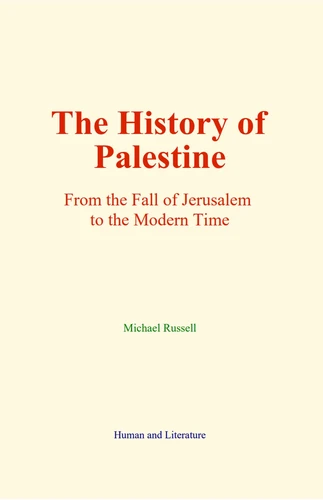The History of Palestine. From the Fall of Jerusalem to the Modern Time
Par :Formats :
Disponible dans votre compte client Decitre ou Furet du Nord dès validation de votre commande. Le format Multi-format est :
- Pour les liseuses autres que Vivlio, vous devez utiliser le logiciel Adobe Digital Edition. Non compatible avec la lecture sur les liseuses Kindle, Remarkable et Sony
 , qui est-ce ?
, qui est-ce ?Notre partenaire de plateforme de lecture numérique où vous retrouverez l'ensemble de vos ebooks gratuitement
Pour en savoir plus sur nos ebooks, consultez notre aide en ligne ici
- FormatMulti-format
- ISBN978-2-38626-403-0
- EAN9782386264030
- Date de parution15/11/2024
- Protection num.NC
- Infos supplémentairesMulti-format incluant ePub avec ...
- ÉditeurHuman and Literature Publishing
Résumé
Palestine is essentially a land of small divisions, and its configuration does not fit it to form a separate entity; it "has never belonged to one nation and probably never will." Its position gives the key to its history... (R. Macalister)
The destruction of Jerusalem, though it put an end to the polity of the Hebrew nation as an independent people, did not entirely disperse the remains of their miserable tribes, nor denude the Holy Land of its proper inhabitants.
The number of the slain was indeed immense, and the multitude of captives carried away by Titus glutted the slave-markets of the Roman empire; but it is true, nevertheless, that many fair portions of Palestine were uninjured by the war, and continued to enjoy an enviable degree of prosperity under the government of their conquerors. The towns on the coast generally submitted to the legions without incurring the chance of a battle or the horrors of a siege; while the provinces beyond the Jordan, which formed the kingdom of Agrippa, maintained their allegiance to Rome throughout the whole period of the insurrection elsewhere so fatal, and especially to the inheritance of Judah and of Benjamin. This book presents the History of Palestine, from the Fall of Jerusalem to the Present Time.
The number of the slain was indeed immense, and the multitude of captives carried away by Titus glutted the slave-markets of the Roman empire; but it is true, nevertheless, that many fair portions of Palestine were uninjured by the war, and continued to enjoy an enviable degree of prosperity under the government of their conquerors. The towns on the coast generally submitted to the legions without incurring the chance of a battle or the horrors of a siege; while the provinces beyond the Jordan, which formed the kingdom of Agrippa, maintained their allegiance to Rome throughout the whole period of the insurrection elsewhere so fatal, and especially to the inheritance of Judah and of Benjamin. This book presents the History of Palestine, from the Fall of Jerusalem to the Present Time.
Palestine is essentially a land of small divisions, and its configuration does not fit it to form a separate entity; it "has never belonged to one nation and probably never will." Its position gives the key to its history... (R. Macalister)
The destruction of Jerusalem, though it put an end to the polity of the Hebrew nation as an independent people, did not entirely disperse the remains of their miserable tribes, nor denude the Holy Land of its proper inhabitants.
The number of the slain was indeed immense, and the multitude of captives carried away by Titus glutted the slave-markets of the Roman empire; but it is true, nevertheless, that many fair portions of Palestine were uninjured by the war, and continued to enjoy an enviable degree of prosperity under the government of their conquerors. The towns on the coast generally submitted to the legions without incurring the chance of a battle or the horrors of a siege; while the provinces beyond the Jordan, which formed the kingdom of Agrippa, maintained their allegiance to Rome throughout the whole period of the insurrection elsewhere so fatal, and especially to the inheritance of Judah and of Benjamin. This book presents the History of Palestine, from the Fall of Jerusalem to the Present Time.
The number of the slain was indeed immense, and the multitude of captives carried away by Titus glutted the slave-markets of the Roman empire; but it is true, nevertheless, that many fair portions of Palestine were uninjured by the war, and continued to enjoy an enviable degree of prosperity under the government of their conquerors. The towns on the coast generally submitted to the legions without incurring the chance of a battle or the horrors of a siege; while the provinces beyond the Jordan, which formed the kingdom of Agrippa, maintained their allegiance to Rome throughout the whole period of the insurrection elsewhere so fatal, and especially to the inheritance of Judah and of Benjamin. This book presents the History of Palestine, from the Fall of Jerusalem to the Present Time.













